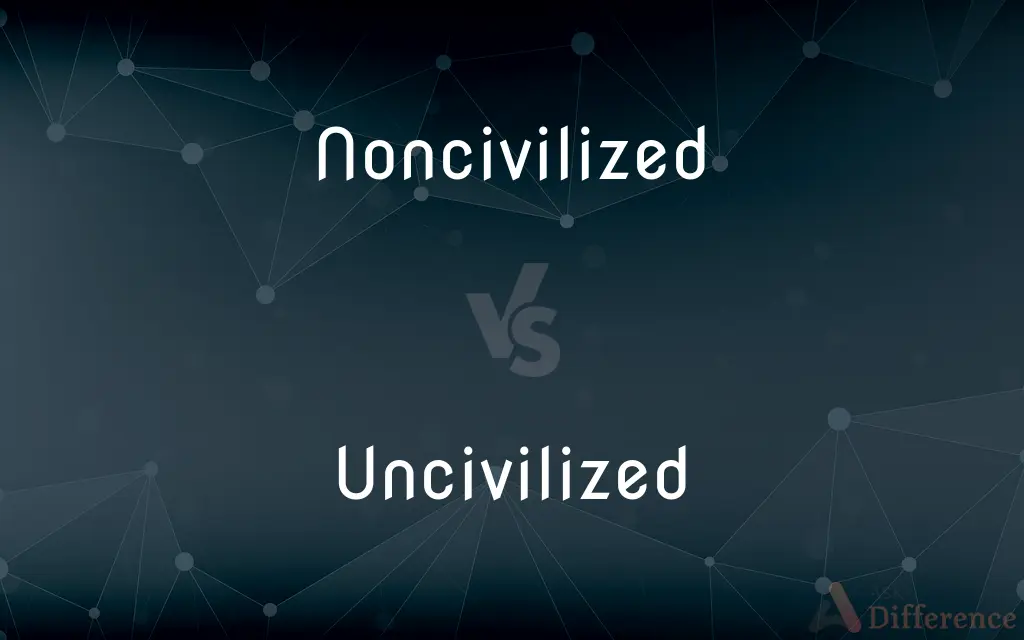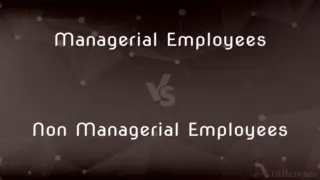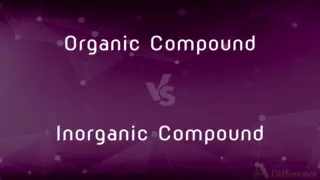Noncivilized vs. Uncivilized — What's the Difference?
By Tayyaba Rehman — Published on October 1, 2023
Noncivilized and uncivilized both refer to a lack of advanced cultural development, but "noncivilized" implies merely the absence of civilization, while "uncivilized" often conveys a sense of barbarism or rudeness.

Difference Between Noncivilized and Uncivilized
Table of Contents
ADVERTISEMENT
Key Differences
Noncivilized and uncivilized are terms that are used to describe the absence of advanced cultural, social, and moral development typically associated with civilizations. Noncivilized generally means not having the complex and advanced societal structures, behaviors, or characteristics of civilization. It primarily denotes the mere absence of attributes linked to civilized societies and does not inherently carry negative or derogatory connotations. It can be seen more as a descriptive term referring to societies or entities lacking established systems, order, or advancements commonly seen in civilizations.
Uncivilized, on the other hand, frequently has a more pejorative implication, suggesting not only the absence of civilization but also a lack of refinement, manners, and cultural sophistication. It often implies being primitive, crude, or barbarous. The term can convey a sense of rudeness, aggressiveness, or a lack of moral and social norms, making it more judgmental and value-laden compared to noncivilized. Uncivilized is often used to describe behaviors or actions that are considered inappropriate, disrespectful, or lacking in restraint and consideration.
While both noncivilized and uncivilized imply a lack of advanced cultural and societal development, the nuance in their usage can convey different levels of judgment and implication. Noncivilized is more neutral, focusing on the absence of characteristics of civilization, whereas uncivilized can imply a moral or cultural inferiority, carrying a sense of disdain or disapproval towards the lack of civilized norms and manners.
In societal and anthropological discussions, it's crucial to approach these terms with sensitivity and understanding, given the potential implications and judgments they might convey. Noncivilized can be a more objective, less harmful way to refer to societies or entities that do not exhibit the advanced characteristics of civilization, whereas uncivilized, due to its negative connotations, should be used with caution and awareness of its potentially offensive implications.
Comparison Chart
Implication
Primarily implies the absence of civilization characteristics
Implies not only absence but also a lack of refinement and manners
ADVERTISEMENT
Connotation
More neutral and descriptive
Often pejorative, conveying rudeness or primitiveness
Usage
Describes entities or societies lacking advanced societal structures
Describes behaviors or entities considered crude or disrespectful
Judgment
Less judgmental and value-laden
More judgmental and can imply moral or cultural inferiority
Context
Used more in objective, descriptive contexts
Requires cautious use due to potential offensive implications
Compare with Definitions
Noncivilized
Noncivilized refers to the absence of advanced societal structures.
Historically, some noncivilized societies lived in harmony with nature.
Uncivilized
Uncivilized implies a lack of cultural sophistication and refinement.
His uncivilized behavior at the formal event raised eyebrows.
Noncivilized
Noncivilized implies not having advanced cultural developments.
Noncivilized communities might not have structured governmental systems.
Uncivilized
Uncivilized often conveys a sense of barbarism or primitiveness.
The depiction of the tribe as uncivilized was criticized for being biased.
Noncivilized
Noncivilized denotes lacking characteristics of civilization.
The noncivilized tribe had its unique set of norms and values.
Uncivilized
Uncivilized suggests being crude, rude, or lacking in manners.
The uncivilized remarks were offensive to everyone in the room.
Noncivilized
Noncivilized describes entities without established civilized systems and order.
Noncivilized regions might lack infrastructural developments seen in civilized areas.
Uncivilized
Uncivilized can refer to the absence of moral and social norms.
An uncivilized society might struggle with internal conflicts and unrest.
Noncivilized
Noncivilized is a more neutral term indicating the absence of civilization attributes.
Anthropologists study noncivilized societies to understand human development.
Uncivilized
Uncivilized is used to describe inappropriate or disrespectful behaviors.
The uncivilized actions were condemned by the community leaders.
Noncivilized
Not civilized.
A noncivilized society
Uncivilized
Not civilized; barbarous.
Noncivilized
Not having a high state of culture and social development
Uncivilized
Not resembling a civilization.
Uncivilized
, barbarous, wild, uncultured.
Uncivilized
Used to describe people who display a marked lack of manners as defined by a given culture.
Uncivilized
Used to describe behaviours deemed savage or inappropriate.
Uncivilized
Not civilized; not reclaimed from savage life; rude; barbarous; savage; as, the uncivilized inhabitants of Central Africa.
Uncivilized
Not civil; coarse; clownish.
Uncivilized
Without civilizing influences;
Barbarian invaders
Barbaric practices
A savage people
Fighting is crude and uncivilized especially if the weapons are efficient
Wild tribes
Common Curiosities
Does noncivilized inherently imply inferiority?
No, noncivilized generally implies merely the absence of characteristics of civilization and is more neutral.
Does uncivilized always relate to societal structures?
No, uncivilized can also describe behaviors, actions, or manners considered crude or disrespectful.
Should uncivilized be used cautiously in discussions?
Yes, due to its potentially pejorative connotations, uncivilized should be used with caution and sensitivity.
Is noncivilized more objective compared to uncivilized?
Generally, noncivilized is considered more neutral and objective, focusing on the absence of civilization characteristics without implying inferiority.
Can noncivilized be used to describe societies?
Yes, noncivilized can describe societies lacking advanced cultural, social, and moral developments typically associated with civilizations.
Can noncivilized imply a lack of advanced cultural development?
Yes, noncivilized implies the absence of advanced cultural and societal developments characteristic of civilizations.
Can uncivilized imply a lack of moral values?
Yes, uncivilized can imply a lack of moral and social norms, often conveying a sense of moral or cultural inferiority.
Is uncivilized a more judgmental term?
Yes, uncivilized often conveys a sense of rudeness, primitiveness, and lack of refinement, making it more judgmental.
Share Your Discovery

Previous Comparison
Managerial Employees vs. Non Managerial Employees
Next Comparison
Chop vs. PareAuthor Spotlight
Written by
Tayyaba RehmanTayyaba Rehman is a distinguished writer, currently serving as a primary contributor to askdifference.com. As a researcher in semantics and etymology, Tayyaba's passion for the complexity of languages and their distinctions has found a perfect home on the platform. Tayyaba delves into the intricacies of language, distinguishing between commonly confused words and phrases, thereby providing clarity for readers worldwide.














































